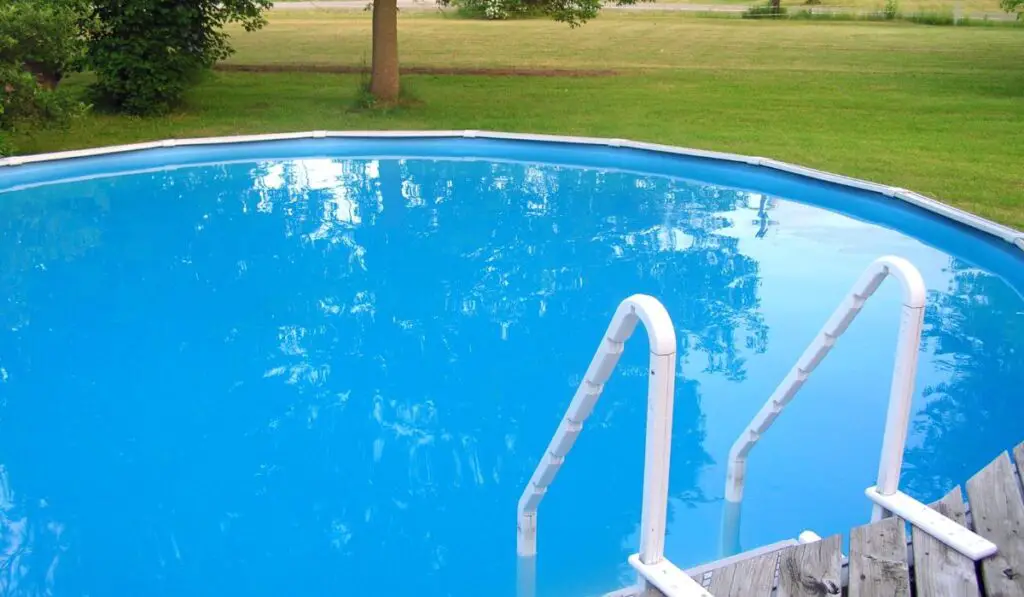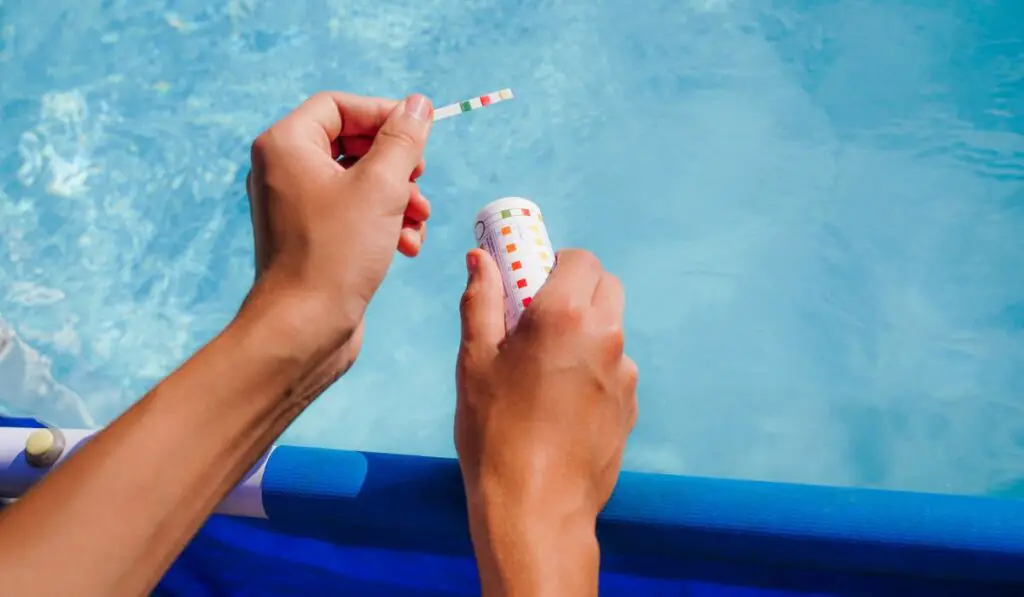The advent of the above-ground salt water pool systems has made salt water pools an easy-to-maintain luxury that many more people can now afford. But there are several different salt water pool systems with different modus operandi, so how can you decide which one is best for your property?
Selecting the best saltwater pool system for your above-ground pool depends on the capacity of your pool and the plumbing system you have in place. You may need to make adjustments to protect metal components from corrosion.
Even though various saltwater pool systems can get the job done well, they all have different specifications and will work most efficiently with certain types of pools. Let’s take a look at each one and where it belongs.
Above-Ground Salt Water Pool Systems

It can be a little confusing when you realize just how many options for saltwater pool systems there are. Let’s look at some of these options below, and then talk about a few more details.
Zodiac Salt Water Pool System: This is a fantastic above-ground salt water pool system. It’s very easy to install and operate. The panel, for example, is straightforward to work with, and it also has the reversing polarity feature, which automatically cleans the cell while in use.
This kind of above-ground pool system unit should be used to chlorinate a pool size of no more than 35,000 gallons.
Hayward Aquarite (on Amazon): The Hayward Aquarite is another above-ground salt water pool system that is reputable for its excellent features. Depending on the cell you buy, the Hayward Aquarite can chlorinate above-ground salt water pool sizes between 15,000 and 40,000 gallons of water. The model we’ve linked to here is for specifically above-ground pools up to 18k gal.
Hayward Aquarite Pro: This above-ground salt water pool system is excellent for creating chlorinated pool water. It even allows pool chemistry automation with the aid of the sense & dispense device. This pool system also has the T-cell 15 Turbo Cell that enables it to effectively chlorinate a pool size of up to 40,000 gallons.
Hayward Aquaplus: This is one of the most sophisticated salt water pool systems you can find anywhere. The whole pool is automated, so you can easily access it with the push of a button for any function you want, like the lights, filtration system, and most significantly, any feature that will facilitate the continual flow of water from the salt pool.
In addition, the pool system also has a compatible pH sense with the dispenser as well as an ORP (Oxygen Reduction Potential), which helps you monitor the effectiveness of the chlorine in your pool.
CircuPool CORE35 Salt Chlorinator System (on Amazon): The installation procedure of this type of above-ground salt water pool system is straightforward. It possesses some features that make its chlorination process very effective. It doesn’t need a control panel to operate as all features of this system can be accessed on the cell with the push of a button.
Can All Above-Ground Pools Be Saltwater Pools?
Unfortunately, not all above-ground pools can be used with salt water. The compatibility of above-ground pools with salt water is highly dependent on the type of materials the pool is made with.
Above-ground pools are normally made with aluminum, steel, or resin. Saltwater does not work well with steel and aluminum, due to the reaction of salt with the materials. Even if there’s a protective coating in the pool, there’s still a very high chance of corrosion and oxidation.
Resin is the only one of these materials that can safely carry saltwater. There are no adverse effects when it reacts with salt. Even though this material has some components, like bolts, that are made of steel, you can always have them easily replaced if necessary.
Pros and Cons of Saltwater Pools
Pros
It’s Gentle on the Skin and Clothing: Saltwater pools are more gentle on sensitive skins and clothing than traditional chlorine pools. Salt water won’t affect your eyes or ears. Furthermore, the saltwater pool also has exfoliating properties, helping swimmers with conditions like acne, eczema, and psoriatic skin.
Elimination of the Chlorine Smell: Since saltwater pools use a more natural process for getting chlorine in the water, you can hardly perceive the harsh smell of chlorine around a saltwater pool.
It Reduces Allergic Reactions and Allows for Better Breathing: One of the things we all love to do when relaxing in a pool is to breathe. Inhalation of salt particles from a saltwater pool helps encourage healthy breathing and reduce the effects of allergies.
They Are Easier to Maintain: Maintaining a saltwater pool requires much less work than maintaining a traditional chlorine pool. In addition, salt is much cheaper than chlorine, so you can also save money.
You Don’t Have to Store Chlorine: Storing chlorine in your house will only take up your space and contaminate your home with its repulsive odor. With the help of the salt chlorine generator in saltwater pools, there is no reason for you to keep storing chlorine in your house anymore.
Cons
Interestingly, saltwater pools have very few cons. In fact, the disadvantages are so few that they are almost insignificant.
Can’t Be Easily Repaired: Saltwater pools are much more sophisticated than traditional pools. Therefore, even when the slightest problems occur, you’ll need to invite an expert over to have a look at it.
How to Choose the Right Salt Water Generator
There are two factors to consider in choosing the right salt water generator:
- Pool Size: As explained earlier, different generators function best with different pool sizes. The capacity of a generator directly affects the quantity of chlorine it produces. Therefore, when choosing a salt water generator, it’s essential to consider the size of your pool and then select a compatible salt water generator.
- Plumbing Type: When getting the right salt water generator, you should make plumbing modifications to your pool. This modification involves the addition of a sacrificial anode that will protect the metal components from any corrosion. Eventually, the salt will eat the anode, but you could always have it replaced.
How to Change an Above-Ground Pool to Salt Water
To change an above-ground pool from chlorine to salt water, you’ll need a saltwater system, pool salt, and a water hose or pool pump. Then you’ll have to:
- Get a Salt Water Generator: First, make sure the water in the pool is clean. The next thing to do is to add the right salt chlorine generator. You could install two kinds of salt systems for above-ground pools: a system that hangs over the pool wall or one placed outside the pool, very close to the filtering system.
- Drain the Water From the Pool: With a pool pump or hose, you should then drain the water from the pool.
- Install the Saltwater System: Now, follow the instructions in the saltwater system manual to carefully install it in your pool.
- Confirm the Correct Quantity of Salt: Looking both at the pool size and the saltwater system’s instruction manual, determine the right amount of salt to put into the pool and then add it.
- Open the Water Supply: You can now open the water supply and allow it to reach the right level before turning on your saltwater system.
- Install a Monitoring System: Finally, you can install a monitoring system. Of course, this last step is optional, but installing it would guarantee that the pool checks the salt level by itself.
Determining How Much Salt to Use
When determining the quantity of salt to put in your water, there are two factors you should consider. These factors include the size of the pool and the capacity of the salt chlorine generator.
The pool size would determine the type of salt water system, and then the system’s manual determines the amount of salt you should add to the pool. There’s no rule of thumb or specific amount of salt to add, or at least there’s not one that’s more reliable than the specific instructions in the manual for your specific system!
In general, though, you’re going to need a lot of salt. For a 5k gal above-ground pool, a solid 160-200lb of iodized pool salt (on Amazon) may be required.
How to Maintain Your Above-Ground Saltwater Pool

As we said earlier, above-ground saltwater pools are easy to maintain; however, they still require some work. To do this effectively, you’ll need to:
- Check the Chlorine Level: The chlorine level of your pool water should not be too high. If it is, you can bring it down either by lowering the productivity of the generator, adding chlorine neutralizing chemicals, or siphoning part of the pool water and replacing it with clean water.
- Inspect Your Chlorine Generator: Another thing to do is to have your generator checked at least every 3 months, or as advised by the manufacturer. This inspection aims to check whether there are excess scales inside your generator cell and these scales can affect the production of chlorine, which keeps your pool clean.
If there is, you can use a scrubbing brush to clean off the scales before reinstalling it. If the scales aren’t there, you can simply reinstall it.
